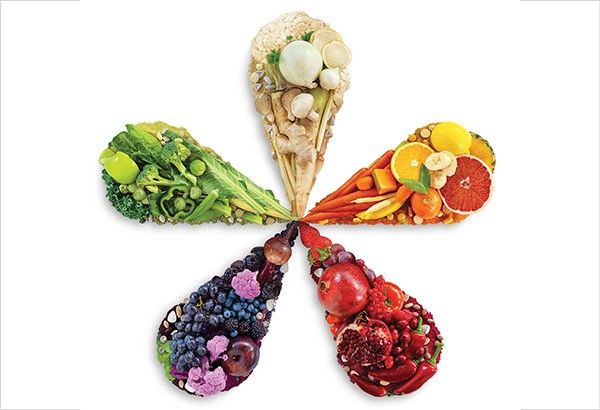Nutritious Noche Buena: 5 food colors that should be on your Christmas plate

MANILA, Philippines — Every Christmas, many Filipinos make sure to have staple Christmas food on their tables come Noche Buena: Lechon, Quezo de Bola, roasted chicken, sweet ham, cake, kakanin, salad and round fruits, among others.
But during times like the current health crisis, people should be more careful of what they eat and pick their food according to color, not just by tradition.
A study from Amway Corporation’s Global Phytonutrient Report revealed that only one in four people meet the minimum recommendation of five servings (400 grams) of fruits and vegetables per day, a reality that has greater implications now more than ever because of the COVID-19 threat.
“Fruits and vegetables contain phytonutrients or phytochemicals that give plants their vibrant color and provide them protection. When consumed, they have antioxidant and anti-inflammatory effects and help enhance immunity,” said Leni Olmedo, Country Manager of Amway Philippines, local branch of the direct-selling giant.
“Amid a health crisis, it is ideal to have at least five to nine servings of fruits and vegetables daily, as recommended by the World Health Organization or WHO, and all five phytonutrient colors on your plate,” she added.
The Global Phytonutrient Report summarizes the total fruit and vegetable intake in servings per day and the primary types of plants available in various global regions.
The five colors and their roles, as enumerated by the study, are:
- Green for cell and vision health
- Red for prostate and heart health
- White to support healthy circulatory system and bones
- Orange for eye health, immune system function, and healthy growth and development
- Purple or blue for antioxidant protection that’s good for the heart
Further analysis by the supplement brand also suggested that consumers may not be meeting the standard due to eating habits that are driven by factors such as cost, seasonal and geographical availability of plants, and accessibility, especially these days where people remain in their homes.
On a local standpoint, recent data from the National Nutrition Council (NNC) shows that 69% of Filipino households do not meet the daily nutritional and energy requirement for productivity.
Olmedo believed that people may maximize benefits from plants by increasing intake and ensuring consumption of all colors, especially as more entrepreneurs find ways to bring fresh produce from farms and markets to households.
She gave examples that are widely available in the country:
- pechay and sitaw for green
- tomatoes and watermelons for red
- garlic, mushrooms and onions for white
- carrots and pineapples for orange
- grapes and eggplants for purple
A recent study by Food Industry Asia shows that Filipinos are prioritizing home-cooked food amid the pandemic due to hygiene and safety concerns from eating outside and ordering from restaurants.
As consumers become responsible for the food at home, decisions are no longer simply about what to eat, but also where the food comes from and how it is made.
According to Euromonitor, Amway’s plant-based health supplement line Nutrilite is said to be the only global vitamin and dietary supplement brand that grows, harvests and processes plants on their own certified organic farms.
Sam Kilgore, Traceability Expert from the company’s Research and Development team, said that the company has its own certified organic farms where it grows, harvests and processes its own plants to turn into ingredients for their in-house supplement brand. This allows them to monitor the entire journey of their supplements and make sure that everything is done safely.
Organic has a healthy connotation to consumers since pesticide- and chemical-free are considered to be safe and more nutritious. Recent research by Ecovia Intelligence show that organic and sustainable food retailers all over the globe are also experiencing significant increases in sales amidst the health crisis, and that the demand for these products is expected to remain strong post-COVID-19.
“Many will keep to these healthy eating habits to help protect themselves,” said Olmedo, “so this amplified awareness and these demands on health and wellness will surely continue to be relevant in the future.”
RELATED: 12.12 days of Christmas: Healthy recipes to try for holiday parties at home



















